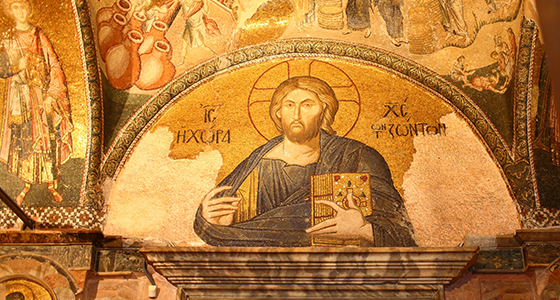The Necessity of Tradition

The first Christians didn’t learn their faith from the Bible because none of the books of the New Testament had been written yet. This is evident in Paul thanking the Corinthians for “maintain[ing] the traditions even as I have delivered them to you” (1 Cor. 11:2), and instructing his disciple Timothy,“what you have heard from me before many witnesses entrust to faithful men who will be able to teach others also” (2 Tim. 2:2).
Paul thanked the Thessalonians for accepting his preaching, not as human words, but as the very words of God (1 Thess. 2:13). In his second letter to this community he told them to “stand firm and hold to the traditions which you were taught by us, either by word of mouth or by letter” (2 Thess. 2:15).
Sacred Tradition is not the same as customs that can change over time,like manner of dress or style of worship (or “tradition” with a lowercase “t”).Tradition (with a capital “T”) refers to the word of God that is “handed on” or “delivered.”It does not change even though our understanding of it grows over time, in the same way our understanding of Scripture grows over time.
In the second century, St. Irenaeus wrote, “While the languages of the world are diverse, nevertheless, the authority of the tradition is one and the same.” He also asked his readers, “What if the apostles had not in fact left writings to us? Would it not be necessary to follow the order of tradition, which was handed down to those to whom they entrusted the churches?”
Traditions of Men?
Some Christians object to the idea of Sacred Tradition because they believe Jesus condemned it. They refer to the time when Jesus told the Jewish leaders, “For the sake of your tradition, you have made void the word of God” (Matt. 15:6). But in this case Jesus was condemning a particular man-made tradition that was contrary to one of God’s commandments. Specifically, Jesus criticized the tradition of applying a sacrificial offering of money,called korban, to the Temple instead of using the money to support one’s elderly parents. This tradition contradicted the Fourth Commandment, which says“Honor your father and mother.”
However, Jesus
did not reject religious tradition as
a whole because he told his disciples to obey the Jewish leaders because they sat on something called “Moses’
seat” (Matt. 23:2-3). This was not an actual chair but a
term that referred to a Jewish tradition, not found in Scripture, about the Jewish leaders’ teaching authority. In fact, prior to his Ascension
into heaven
Jesus never commanded the apostles to write anything down. Instead, their
mission was to preach the gospel and the word of
God continued to be passed down in oral tradition even after the New Testament was
written.
Did you enjoy this excerpt? Order your copy of Why We’re Catholic today for just $10 (Includes Shipping – US Only)
Recent Posts
-
Should We Expect a “Rapture” at Any Moment?
If the news we watch every day, and the social media we follow is true, the end times must be just a …Apr 30th 2024 -
The Synthesis of All Heresies
“Trent, can you respond to what this Catholic said online? It’s just really confusing.” Normally, I …Apr 17th 2024 -
The Curious Case of Camels
So Jacob arose, and set his sons and his wives on camels.—Genesis 31:17Many biblical skeptics have c …Mar 25th 2024












